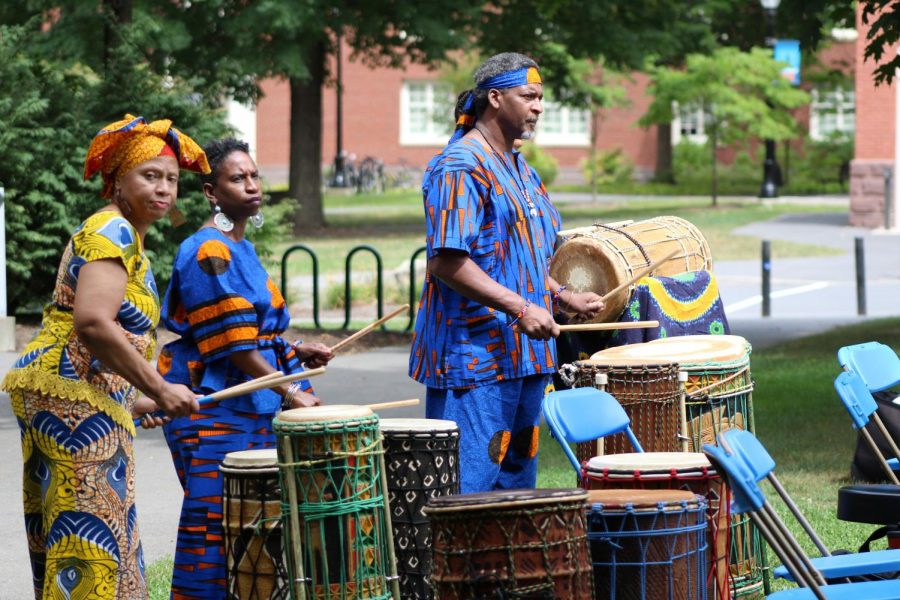Drumming to the beat of West African history
September 9, 2020
Summer of Change
As plenty of students at the University are aware, this past summer was a time for demanding change — at the University, in our local communities and in the greater world. Since the beginning of the pandemic, the world has noticed the disparities between which communities COVID-19 impacts the hardest, all in terms of health statuses and medical abilities, educational opportunities and income. Alongside the pandemic, recent incidents of police brutality have further illuminated the United States’ need to combat discrimination and injustice.
The Griot Institute
While many organizations at the University share the goal of fighting injustice on campus, the Griot Institute for the Study of Black Lives & Cultures is a central figure at the University for exploring interdisciplinary artistic, scholarly, cultural and intellectual products of Africana communities, both historically and in contemporary times. Through a variety of programs and events, the Griot Institute stands to address diversity and the inclusiveness, alienation and isolation of students of color; use programming on campus to teach the University’s students about race, discrimination, and racism; aid the University’s efforts in becoming more diverse and inclusive; and promote academic models with more comprehensive focuses on Africana studies, among many other goals on the University’s website.
In particular, some programming and scholarship events sponsored by the Griot Institute on-campus are the Griot Project Book Series, the Annual Lecture and Performance Series, the Bi-Annual Conferences held on-campus, Martin Luther King Jr. Week, a variety of undergraduate research and projects and the Bucknell in the Caribbean trip.
Additionally, this semester the Griot Institute is holding West African Drumming sessions as a special educational opportunity for students to learn the drumming traditions and histories.
West African History
Historically in West African cultures, the term “griot” is known as a member of a class of traveling poets, musicians and storytellers who maintain the tradition of history preservation via word of mouth. A “griot” is a central figure in West African culture, often encouraging many community-based functions and acting as a community historian, cultural critic, indigenous artist and collective spokesperson. The University’s own Griot Institute shares this same central goal: creating a space that allows both students and faculty to take part in activities surrounding the cultures, histories, narratives, peoples, geographies and arts of Africa and the African diaspora. According to their website, the Griot Institute for the Study of Black Lives & Cultures shares a similar mission to that of a “griot” in West African culture as a “collaborative enterprise devoted primarily to the interdisciplinary exploration of the aesthetic, artistic and scholarly cultural products and intellectual currents of historical and contemporary Africana communities.”
Having such a space on campus and support of minority communities is especially important in the world’s current state of civic unrest, with the horrific murders of George Floyd, Breonna Taylor, Atatiana Jefferson, Aura Rosser, Stephon Clark, Botham Jean and Philandro Castille, and hundreds of others. Organizations such as the Griot Institute allow for African American students, as well as all students on-campus, to learn and be involved in activities inspired by a diverse array of cultures. It also offers the whole University community an opportunity to educate themselves on the cultures of their fellow students.
West African Drumming
One of the many ways that students can aid in the Griot Institute’s mission is to attend their introductory sessions to West African drumming traditions. This semester, the Griot Institute will run a free eight-week, noncredit experience where students and faculty can learn about West African traditions and their histories. Due to COVID-19 precautious and social distance regulations, only five people will be allowed to participate in-person in the Hildreth-Mirza Great room, where a drum will be provided. However, there is also the option to participate remotely via zoom. The sessions will be held on Tuesdays from 11:30 a.m.-1 p.m., starting Sept. 22 through Nov. 10. Further information about registration for the West African drum lessons will be posted on the University’s Message Center and the Griot Institute events page. For more information about the Griot Institute, its mission and its events, the program can be contacted via their email at griot@bucknell.edu.






















